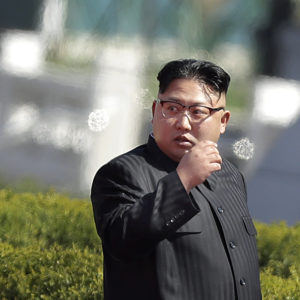The reported visit of North Korea’s leader Kim Jong-un to Beijing raises questions in Washington as well as Seoul about what he might be doing there and what he wants to get from the Chinese.
With the arrival in Beijing of the same armored train that carried his father Kim Jong-il to Beijing soon before he died in 2011, Kim Jong-un was assumed to be on a desperation mission to gain Chinese support in coming summits with South Korea’s President Moon Jae-in and U.S. President Donald Trump.
Analysts think Kim above all is presenting his case against sanctions that have driven the North Korean economy to its lowest levels in years. North Korea is suffering from China’s refusal to import North Korean coal, in accordance with U.N. sanctions, and also to export to North Korea all the oil that it needs to fuel its dilapidated economy.
Much as he hates to be in the role of a beggar, Kim Jong-un needs Chinese support against what he sees as rising pressure from the United States while hard-liner John Bolton is about to take over as Trump’s national security adviser. Bolton has advised against any concessions to North Korea unless Kim absolutely agrees to denuclearization.
Kim’s best hope is to make a show perhaps of freezing nuclear and missile tests while the United States and South Korea agree not to carry out war games. He has accepted the reality that U.S. and South Korean forces will open their annual Foal Eagle and Key Resolve games on April 1 as now scheduled but would like the Chinese to call for lifting or at least easing sanctions in the United Nations.
The urgency of Kim’s mission is obvious from his decision finally to travel outside North Korea for the first time since he took over after his father’s death in December 2011. Kim, who went to school in Switzerland, traveled with his father on at least one trip to Beijing but has avoided travel as outside North Korea as the country’s “respected leader” amid strained relations with China as well as Russia, both of which have criticized his nuclear program.
Kim can be sure, however, of greater support in China in view of tariffs as high as 45 percent imposed by Trump on Chinese products, including steel. Trump has accused the Chinese of stealing American technology while dumping products on the United States at low prices made possible by vastly underpaying Chinese workers.
The Chinese have vigorously denounced the tariffs and other barriers imposed by Trump, warning of a “trade war” even though Chinese exports to the United States now are approaching an incredible $400 billion a year.
China’s foreign minister Wang Yi called the Trump tariffs a “mistaken prescription” that would ultimately be “harmful” to the United States and the U.S.-China relationship. Trump tweeted that it would be a good idea if China’s trade surplus with the United States were reduced by $1 billion a year — a relatively small figure given their current enormity.
At the same time, deepening the confrontation of forces in northeast Asia, Trump has for the moment settled its trade dispute with South Korea, which is doubling the import of American motor vehicles from 25,000 to 50,000 a year. In turn South Korea has agreed to slash its steel exports to the United States, holding them at 70 percent of current levels.
The Trump administration came to these terms with South Korea while cooperating with President Moon’s anxiety to achieve rapprochement between North and South and open dialogue. The United States is emphasizing the need to maintain the military alliance with South Korea while still supporting the Moon-Kim summit.
U.S. and South Korean military leaders have emphasized, however, the need for tightening bonds while the South strengthens its military establishment.
A sure sign of North Korea’s worries about the strong U.S.-South Korea alliance is that the North’s party newspaper, Rodong Sinmun, has warned against South Korea’s armed forces betraying the “spirit of cooperation” between the two countries.
North Korea has yet, however, to publicize the Moon-Kim summit. Nor has the North hinted at a possible summit between Kim and Trump though the North Korean state media has refrained ever since the Winter Olympics last month from its customary insults.
While speculation was rampant about Kim’s reported mission to Beijing, some analysts think China’s President Xi Jinping may have urged him to pay a visit.
Victor Cha, professor at Georgetown University and a distinguished expert on North Korea, wondered if Xi were “finally redirecting NK policy” in the aftermath of China’s National People’s Congress at which he was named president virtually for life.
By going to Beijing, said Cha, Kim might be “saving face & giving appearance of policy-coordination” in advance of the coming summits with Moon and Trump. But what, Cha asked, might be “the Chinese’s gift for KJU kissing the ring & is it a violation of sanctions?”

